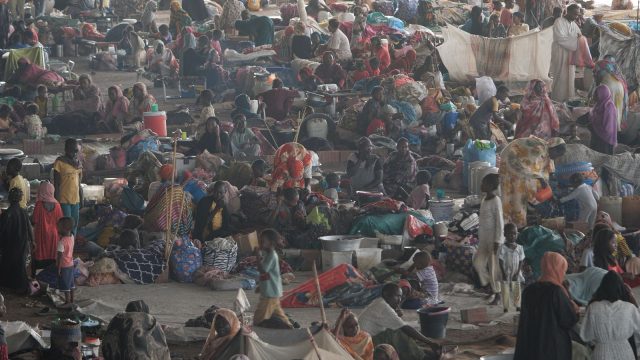A tarmac road winds through sprawling hectares of farmland bordered by an irrigation canal in Al Jazira state, the centre of Sudan’s agricultural heartland. The idyllic scene of green arable land will be ready for October’s harvest.
But just an hour’s drive down this road is the besieged state capital of Wad Madani, where civilians are being terrorised by the Rapid Support Forces (RSF) as they battle the army for territorial control.
The ongoing war has pushed 14 million people in Sudan to acute hunger and 1.5 million are now either facing famine or at risk of famine, according to the United Nations’ World Food Programme (WFP).
Despite millions of hectares of arable land, the spreading violence has meant that the farmers who fed the country and the region are on the verge of mass starvation.
We stood at a military checkpoint on the edges of Al Jazira’s farms as people moved in and out. Some soldiers were on the back of farmers’ trucks. Others were rummaging through the bags and documents of young men standing by a bus that brought them out of enemy territory.
A picture of rural serenity marked by militarisation.
“The farms on this side have been impacted,” says Abdullahi, gesturing to the road deeper into the state. He is sitting on the back of a pick-up truck full of men and a couple of soldiers.
“But the farms in front are safe,” he adds, pointing to the farms further away. He has been farming since childhood and has a look of sad resignation.
“The war has affected our farms so badly. There is no funding, no fuel, no fertiliser, no pesticides. There is nothing this year.”
Read more:
‘Give me your daughter, or we’ll take her’
Millions of Sudanese displaced by war face a new fight
As Abdullahi travels deeper into Al Jazira, a farmer called Yousif Hassan drives out. His pick-up truck is full of family and friends riding in the back. They know that – for now – they are the lucky ones.
“We know people in a village called Tanoub. They lived there for generations but when the war came they had to flee the land,” says Yousif.
“All their lentil farms were burnt down and now they are scattered to different safe places. They left the village empty – not a single person stayed.”
We head back to Gadarif, Al Jazira’s neighbouring state and another farming hub. Here the iconic sesame fields are a site of safety and the community – steeped in respect for the importance of agriculture – are working hard to ease the suffering of those who have fled their hometowns in agricultural states.
Mahad Haj Hassan, a religious school off the side of a main road in Gadarif town, is now a makeshift camp housing 5,000 displaced people. There are currently 280 pregnant women in the camp and many of them are sleeping on mats on the hard ground. Their only steady support is the volunteers running the camp on the ground level as students learn Qu’ran on higher floors.
In the corner of the school yard, the tents of displaced farmers are huddled together.
“All of us here are farmers,” says Mansour, gesturing to the men, women and children all around him. “The RSF came into our homes – attacking people, torturing people and killing people.”
He adds: “We left our homes and our elderly – who later died of hunger. We left our farms. We grew wheat, sugar cane, eggplant and watermelon and left that all behind. And now, it is time for harvest.”
A surprise meal arrives: buckets of cooked rice and potatoes donated by a group of agriculturalists eager to help.
“The people here came with nothing, only what they escaped with. Yes, they are coming from farming areas but they have nothing now to sustain themselves,” says Fatma Adam Hassan, head of the Agricultural Development Organisation.
“They are in need so we have to intervene.”





















